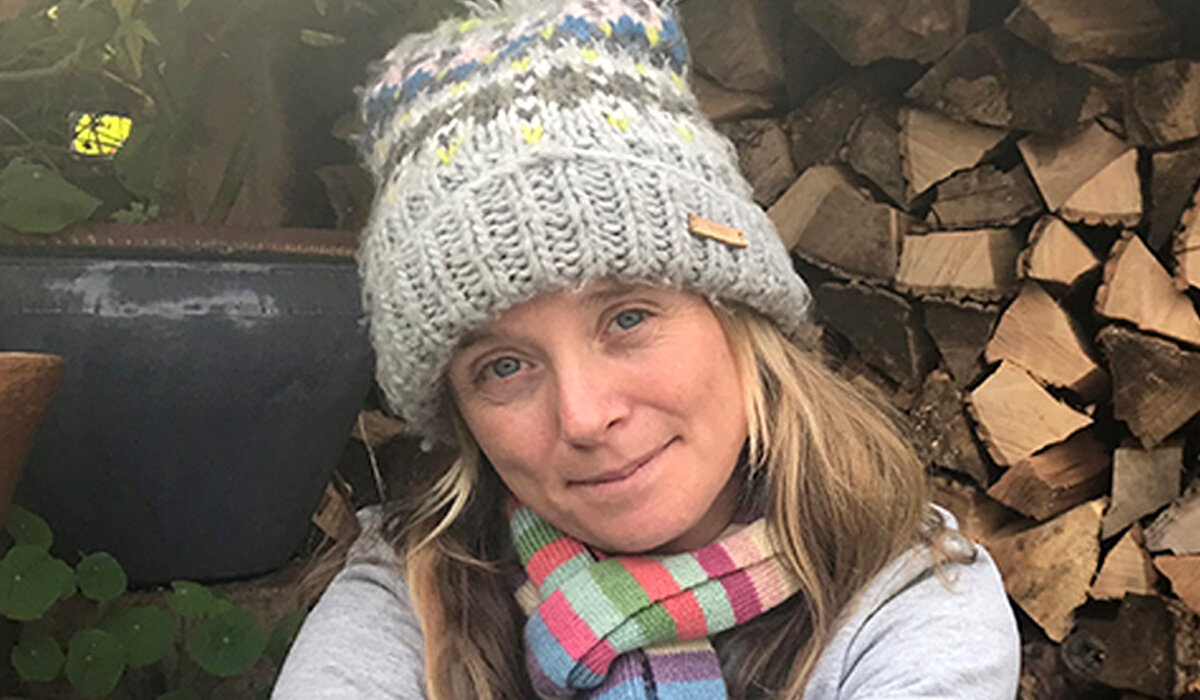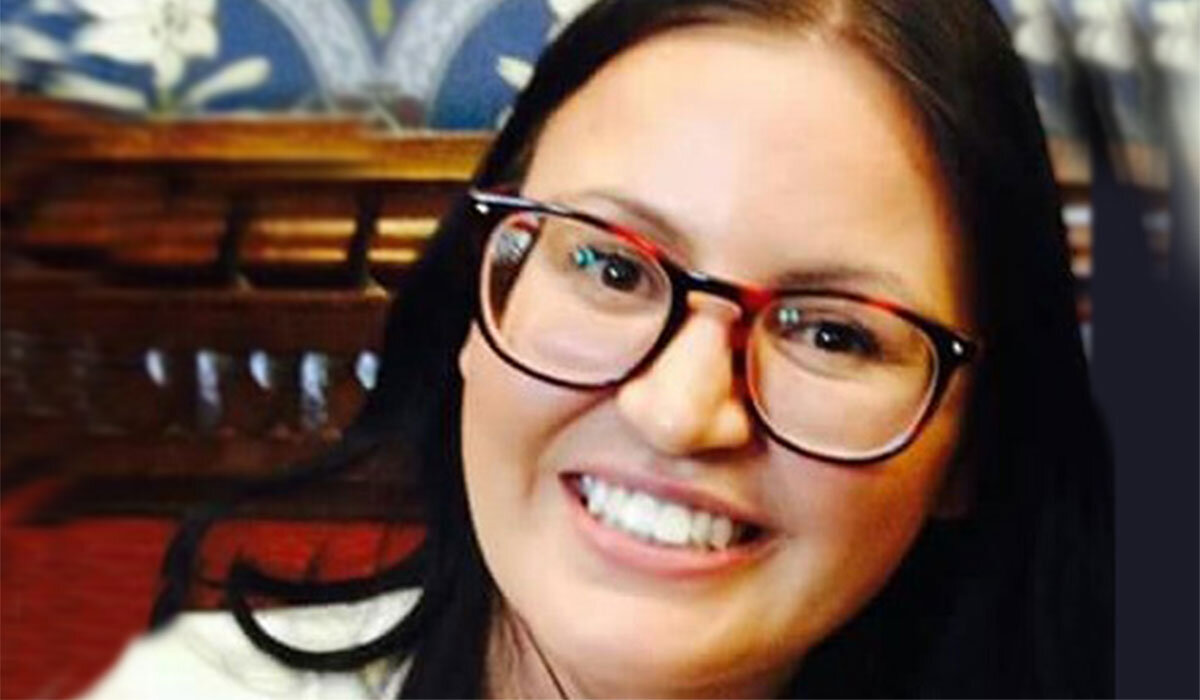
"Don't feel like you have to hide your autism from your children. That way they know what's going on and they don't worry about it."
Purple Ella
- on parenting and discussing autism with her children
Stories from the Spectrum: Purple Ella
Having children can be wonderful, stressful and unpredictable all at the same time – as many parents will agree! It may be particularly overwhelming for parents on the autistic spectrum, who can struggle with the emotional and sensory overload of having a child. However, being autistic can also be a really positive thing when it comes to parenting.
This Mother’s Day, we caught up with Purple Ella to talk more about this. Ella is an autistic parent, a blogger, and a fan of all things purple. She spoke to us about life on the spectrum, being an autistic mother, and the inspiration behind her colourful persona.
When were you diagnosed as autistic?
I was diagnosed in 2015 at the age of 36. Like many autistic women I was diagnosed shortly after my eldest child was diagnosed. I then realised I might be on the spectrum too, so went to the GP. I got referred to the Autism Spectrum Service in Bristol and then had follow up support.
I did a three hour interview, where they asked me about my life and how I reacted to certain things. At the end, they told me I was going to get the diagnosis and confirmed that I am autistic.
Do you think having a later diagnosis has had an impact on you?
Yes. I think there are a lot of people in the same situation as me. When I was growing up, there wasn’t really the option to get a diagnosis if, like me, you were verbal and of average/above average intelligence. It wasn’t really a thing at all.
What is being autistic like for you?
I don’t really know what not being autistic is like! For me, being autistic can be both a positive and a negative thing.
I’m really passionate about the things I’m interested in and have a strong sense of justice. I’ll fight for the things I believe in. Being autistic means I’m unique, which can be a good thing as it means you stand out in a positive way sometimes. I’m also a really good problem solver. My family and friends often come to me with their problems and I like the challenge of thinking of solutions.
On the negative side of things, I’m really sensitive and I have high levels of anxiety – which I believe is very common for people on the autistic spectrum. For instance, yesterday I was thinking about the whole Coronavirus thing. I’d spent too long on X and it’s all everyone’s talking about there! I just started to feel really anxious. I also struggle with self-esteem issues, which is also common for people diagnosed later in life. I’ve been rejected a lot in my life, and judged a lot. As a result, my self-esteem tends to vary on a day to day basis, and sometimes I can feel really bad about myself.
Sometimes I wish I could be more laid back, but on the whole I’m glad to be who I am. The world needs problem solvers and people who are going to fight for the causes they believe in.
What’s being a mum like?
I have three children, and I’ve had them all over the space of four years, which was intense. At the time I didn’t know I was autistic. The early part of parenting was really challenging. Before I became a parent I had my routine that worked for me. Then when I had my first baby - I’m sure this is something a lot of mothers can relate to (autistic or not) – it’s like a bomb was thrown into my life.
When you have a baby you can’t have a shower whenever you like or eat when you like. Your routine is dictated by the baby’s needs. When they’re crying and when they’re hungry you have to attend to it, even if your routine tells you otherwise. You just have to drop everything and deal with the baby.
On top of that, it’s difficult to get any sleep, especially in the early months. I actually ended up staying in a specialist mother and baby unit for people with mental illnesses and those struggling with post-natal issues. They didn’t know I was autistic but they provided a lot of support. I spent time there learning to cope and learning to get back into a routine before I returned home.
Having a toddler and a baby and another baby was intense! When they all reached the six month mark, I was able to cope and had established a routine, and I really love being a mother. My children are fantastic kids and I’m really proud of them. Being a mum is a really rewarding experience. It has its highs and lows but it keeps life interesting and there’s always something to focus on.
Do you think being autistic has an impact on your approach to parenting?
I’d say there are strengths and weaknesses.
A weakness for me is sensory sensitivities. Children are noisy and messy! That can be quite difficult, particularly when you’ve got two children talking to you at once, or a baby crying and a child talking. I can get quite overwhelmed by multiple demands and I really need to focus on one thing at a time. When you’re parenting you really can’t do that – you’ll be cooking dinner while helping someone with homework, while putting plasters on a child who’s just fallen over. It’s just a lot all at once. It the early days of parenting, this led to more meltdowns and more overload for me.
In terms of strengths, I think I’m very logical about boundaries. My approach is, ‘this is the right way to do things, so this is what we’re going to do.’ I think I’m quite consistent in the way I parent because I’m routine led – I set clear bed times, clear approaches to homework, their diet etc. That’s good for me and good for them because they know what to expect. Children thrive on predictability, autistic or not. I think being autistic means that I really ace that side of parenting. This is something that can get overlooked when we talk about autistic mothers. Actually, some of the aspects of being autistic are things that suit children.
What challenges do you face as an autistic mother?
Accessing support is difficult. You don’t want to be judged as a mother. So if you go and ask for support it’s almost like you’re saying you can’t cope. Because I have an autism diagnosis, I feel like I’m under more scrutiny.
I think there’s a stereotype that autistic people are cold and unfeeling – a Dr Spock sort of caricature! In my experience, that couldn’t be further from the truth. I think most autistic people actually feel emotions very deeply and can be very sensitive and loving. Interestingly for me, I don’t like physical contact in general, but it’s completely different with my kids. I love cuddling them or having them sit on my lap, which is something people might not necessarily expect. I don’t fit any of the typical support boxes or fit a certain pattern of someone who needs support. Autistic people can have a bit of a spiky profile – so we have real strengths and weaknesses. So if you meet me, you might think I’m coping really well, but you don’t see me when I’ve had a meltdown and I really can’t cope.
I’m also physically disabled. I’ve got Ehlers-Danlos Syndrome. Despite having two fairly life-altering conditions, I’ve never actually been able to receive support. I’ve asked for care assessments, but it’s just not happening for me – because of that spiky profile.
Meeting other mums at ante-natal classes and on school runs, dealing with teachers and doctors is really difficult for me. When I started I didn’t know I was autistic. Even after I was diagnosed I didn’t want to mask and pretend to be neurotypical, as it’s not good for my mental health. But to a certain extent I have to mask to fit in. I don’t want my ‘quirkiness’ to have a negative impact on my kids.
A lot of these situations revolve around small talk, which I’m really bad at. I have struggled to fit in around other parents. I also have to be professional around teachers, and I don’t really modify my behaviour depending on who I’m talking to, but I’ve had to do so just to avoid the drama that being myself can cause. It’s easier now, as I’ve become sure of who I am.
Are any of your children autistic?
My eldest was first diagnosed, and my youngest was diagnosed when she was five, around 2016. We’re the majority (my husband and my middle child are not autistic), so autism in our house is really normal.
Having autistic children comes with its own challenges, as you have to attend even more meetings and be a bit more on the ball. My youngest daughter is being home educated, so she’s at home full time.
Any advice for fellow autistic parents?
Make sure you get into a routine, particularly when the kids are really small. This will give some structure and predictability to your life. That way you won’t wake up in the morning thinking, ‘I’ve got a whole day of parenting ahead of me!’
Executive functioning is often difficult for autistic people. There’s a lot of admin involved when you’re a parent. Find a strategy for staying organised that works for you.
It’s important to find your community. This has really helped me. For instance, I’ve got friends who will come with me on the school run if I’m feeling a bit wobbly that day. It can be harder to find your community when you’re autistic, but they are out there and it’s worth the effort of ‘friend dating’ – going out and getting to know a few people until you find some good matches. The internet (meet up groups etc.), the school playground and activity groups are great places to start.
I met the other mums I’m friends with now after I was diagnosed, through the autism community in my area. Two of them are autistic and one has an autistic child. I’ve also been able to support them with their autistic children.
It’s also important to be honest with your children. With my kids, I’m honest about my struggles. For instance, if they see me have a meltdown (I’ve never had one that’s put them in any danger), I will explain to them what happened afterwards, and I will apologise to them. If they’re all talking to me at once I’ll say, ‘this is hurting mummy’s brain! I have sensory sensitivities, so you need to talk to me one at a time.’ Don’t feel like you have to hide your autism from your children. That way they know what's going on and don’t worry about it, they don’t worry as much about their own mistakes, and it makes them more compassionate.
"Don’t feel like you have to hide your autism from your children. That way they know what's going on and don’t worry about it."

How can friends, family and members of the public support autistic parents?
Offer specific support. Rather than just saying, ‘let me know if you need any help,’ say, ‘can I bring round dinner tonight?’, or ‘can I take the children out for a bit?’ The parent is more likely to take you up on your offer.
Be encouraging. Autistic people can be really anxious and hard on themselves. So if you say something like, ‘you’ve been a brilliant mother today’, that’s going to lift them up and keep their self-esteem bucket topped up.
Don’t make assumptions about the person because they’re autistic. Get to know the person as an individual and find out what their needs are.
What do you enjoy doing in your free time?
I like drawing. I love Lego. I know it’s meant for kids, but I love it! I like board games, and watching TV and movies. I’m a big Netflix fan. I also love spending time with my dog.
Where does the name Purple Ella come from?
It’s a bit random! I started out as a mummy blogger. I couldn’t think of a name, but I just really love the colour purple, and it gave me a great excuse to wear purple. People who love purple tend to be very committed to our love of purple. It’s not just a favourite colour, it’s a way of life!
Keep up with Purple Ella's latest adventures and watch her videos on her YouTube channel here.
Similar stories

"I know if I'm planning anything that overloads my senses, I have to make sacrifices. I need to be at home alone with the lights off to compensate."
Carly Jones MBE
- on coping with sensory overload
Read more

The Spectrum magazine
Explore one of the UK's largest collections of autistic art, poetry, and prose. The Spectrum magazine is created by and for autistic people, and is available both online and in print.
Read the Spectrum





You are not alone
Join the community
Our online community is a place for autistic people and their families to meet like-minded people and share their experiences.
Join today